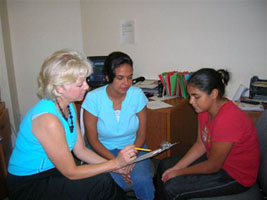Anorexia Nervosa
- Dieting or restricting foods excessively
- Very thin appearance, may continue to lose weight, has difficulty gaining weight or refuses to maintain body weight at or above a minimally normal weight for age and height
- Distorted body image - complaining of feeling fat when in reality is very thin
- Intense fear of gaining weight
- Delay in onset of menstrual cycle or frequent irregularities
- Preoccupied with food, calories, or cooking
- May use purging methods such as vomiting, starving, extreme exercise regimens, diuretics, or laxatives after eating any food
[back to top]
Bulimia Nervosa
- Eating an amount of food in a two hour period of time that is definitely larger than most people would eat during a similar period of time and under similar circumstances
- Feeling a lack of control over eating during the bingeing episode
- Reacting to emotional stress by overeating
- Obsessively concerned about weight
- Uses the bathroom frequently after meals
- Feelings of shame, guilt, or being out of control after eating
- Frequent menstrual and weight irregularities
- Uses purging methods such as vomiting, starving, extreme exercise regimens, diuretics, or laxatives
[back to top]
Binge Eating Disorder
- Eating more rapidly than normal
- Eating until the point of feeling uncomfortably full or eating large amounts of food when not hungry
- Often eating alone due to shame or guilt due to being embarrassed about how much one is eating
- Feeling disgusted, depressed or guilty after overeating
- History of many fluctuations in weight
- Purging behaviors do not occur after the bingeing episode
[back to top]
What is Normal Eating?
Adapted from: How to Get Your Kid to Eat… But Not Too Much by Ellyn Satter
- Being able to eat when you are hungry and continue eating until you feel satisfied.
- Choosing food you like, eating it and truly get enough of it. Not just stopping eating because you think you should.
- Being able to use some moderate constraint in your food choices to get the right foods for optimum health but not being so restrictive that you miss out on foods that give you pleasure.
- Three meals a day and 2-3 snacks but it could also be a day of munching a long the way.
- Leaving some cookies or cake on the plate because you know you can have some again tomorrow. Or, eating more now because it tastes so wonderful when it’s fresh.
- Overeating on occasion, feeling stuffed and uncomfortable sometimes.
- Undereating at times and wishing you would have had more.
- Trusting your body to make up for your mistakes in eating by listening to its needs.
- Takes up some of your thoughts, time and attention but keeps its place as only one important area of your life.
- Being flexible and knowing it varies in response to emotions, schedule, hunger and availability of food.
[back to top]
Treatment Options
Optimal Nutrition can provide the nutrition expertise to the child and family dealing with an eating disorder. Establishing healthy eating behaviors, fostering a healthy attitude toward food, safe weight gain, meals plans, understanding the need for healthy eating, addressing society's role in the eating disorder and nutrition education components are all part of the nutrition counseling sessions. Our registered dietitian works only with children and adolescents in treating eating disorders and will provide the caring and supportive counseling environment a child needs.
Optimal Nutrition will work with and provide necessary information to other medical professionals you may be working with already such as doctors and therapists. If a referral to another medical professional is needed, we will provide that as well.
For more information on either of these treatment options, contact Optimal Nutrition at OptimalNutrition4U@cox.net or 480-570-1212
|

